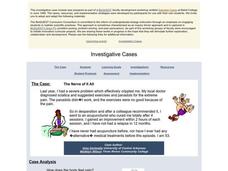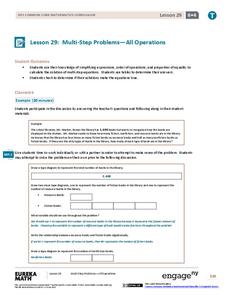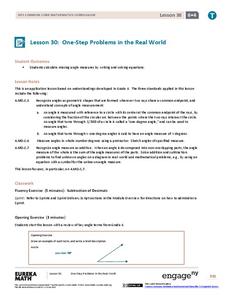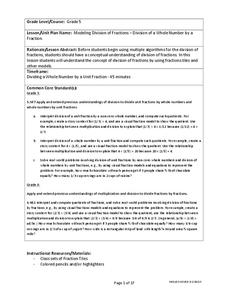Curated OER
Deciphering Word Problems in Order to Write Equations
Help young mathematicians crack the code of word problems with this three-lesson series on problem solving. Walking students step-by-step through the process of identifying key information, creating algebraic equations, and finally...
Mt. San Antonio Collage
Review: Solving Equations
While there are many types of equations to solve, the main focus here is on quadratics. Starting with a quick review of the different methods, learners are guided through the solving process and are challenged to solve higher level...
University of Kansas
Exponential and Logarithm Problems
This worksheet manages to provide both fun and serious work solving exponential and logarithmic application problems in engaging story lines and real-life situations. A strong emphasis on science applications and numbers pulled...
EngageNY
Applying Tangents
What does geometry have to do with depression? It's an angle of course! Learners apply the tangent ratio to problem solving questions by finding missing lengths. Problems include angles of elevation and angles of depression. Pupils make...
Illustrative Mathematics
Dividing by One-Half
Understanding when to divide by two or one-half can be confusing. Here is an activity that gives four different scenarios. It is up to your number crunchers to decide if they divide by two or one-half. The easiest way to approach the...
Charleston School District
Solving Exponent Equations
Show your class that not all equations are linear. The lesson asks learners to solve simple quadratic and cubic equations using square and cube roots. Problems include equations with no solutions.
BW Walch
Solving Linear Inequalities in Two Variables
Although graphing a linear inequality on the plane is but a few steps added onto the graphing of a linear equation, for many learners the logical leap is quite intimidating. This approachable PowerPoint presentation breaks graphing...
EngageNY
Multi-Step Problems—All Operations
Harness the power of algebra to solve problems. Young mathematicians learn to work out multi-step problems by applying algebraic techniques, such as solving equations and proportions. They use tape diagrams to model the problem to finish...
BW Walch
Solving Systems of Linear Equations
Solving systems of equations underpins much of advanced algebra, especially linear algebra. Developing an intuition for the kinds and descriptions of solutions is key for success in those later courses. This intuition is exactly what...
K-5 Math Teaching Resources
Adding Mixed Numbers (Unlike Denominators)
Mix things things up in your elementary math class with a series of problem-solving exercises. Presented with a series of mixed number word problems, young mathematicians are asked to solve them by using either visual fraction...
EngageNY
Interpreting and Computing Division of a Fraction by a Fraction—More Models II
No more inverting and multiplying to divide fractions. Applying concepts of measurement division from the previous lesson, pupils consider partitive division using fraction bars and number lines. They first convert fractions to like...
EngageNY
One-Step Problems in the Real World
Mirror, mirror on the wall, which is the fairest resource of them all? Individuals write and solve one-step equations for problems about angle measurement, including those involving mirrors. Both mathematical and real-world problems are...
Illustrative Mathematics
Plastic Building Blocks
Let's build a castle! Dennis and Cody have big plans, but do they have enough blocks between the two of them to accomplish their goal? A great context that requires students to add and compare mixed numbers. Encourage the use of pictures...
Rational Number Project
Initial Fraction Ideas Lesson 22: Overview
Have young mathematicians subtracting fractions in no time with this manipulative-based math activity. Using their sets of fraction circles, students explore a number of word problems involving the subtraction of fractions before working...
Charleston School District
Solving for a Missing Dimension
If a can has a volume of twelve ounces, how tall it should be? If you can work with volume formulas, it's is an easy measurement to find. After finding the volume of figures in the previous lesson of the series, learners now...
Curated OER
Rearranging Formulas
How do you solve for a variable? This slideshow provides definitions, key concepts, and guided practice to teach learners how to solve literal equations for a specified variable.
West Contra Costa Unified School District
Modeling Division of Fractions
Introduce young mathematicians to the process of dividing fractions with a hands-on math lesson. Using the help of fraction strips and other visual models, children work through a series of example problems as they...
EngageNY
Deriving the Quadratic Formula
Where did that formula come from? Lead pupils on a journey through completing the square to discover the creation of the quadratic formula. Individuals use the quadratic formula to solve quadratic equations and compare the method to...
EngageNY
Using Trigonometry to Determine Area
What do you do when you don't think you have enough information? You look for another way to do the problem! Pupils combine what they know about finding the area of a triangle and trigonometry to determine triangle area when they don't...
Charleston School District
Converting Fractions and Decimals
A decimal is just a fraction in disguise! Scholars learn methods for converting decimals and fractions including repeating decimals. Performing the conversions strengthens their understanding of the relationship between the two forms....
Illustrative Mathematics
Bank Shot
Young geometers become pool sharks in this analysis of the angles and lengths of a trick shot. By using angles of incidence and reflection to develop similar triangles, learners plan the exact placement of balls to make the shot....
Curated OER
Using Random Sampling to Draw Inferences
Emerging statisticians develop the ability to make inferences from sample data while also working on proportional relationships in general. Here, young learners examine samples for bias, and then use random samples to make...
Illustrative Mathematics
Listing Fractions in Increasing Size
Increase the depth of your class's fractional number sense with this number-ordering activity. Given four fractions, each with different numerators and denominators, young learners are asked to place them in order from smallest to...
Balanced Assessment
Shirts and Flags
Learn the importance of geometry to tailors. Given a shirt sewing pattern, scholars determine the actual size of the shirt. After which they answer questions that require problem solving and extending their understanding of scale.























